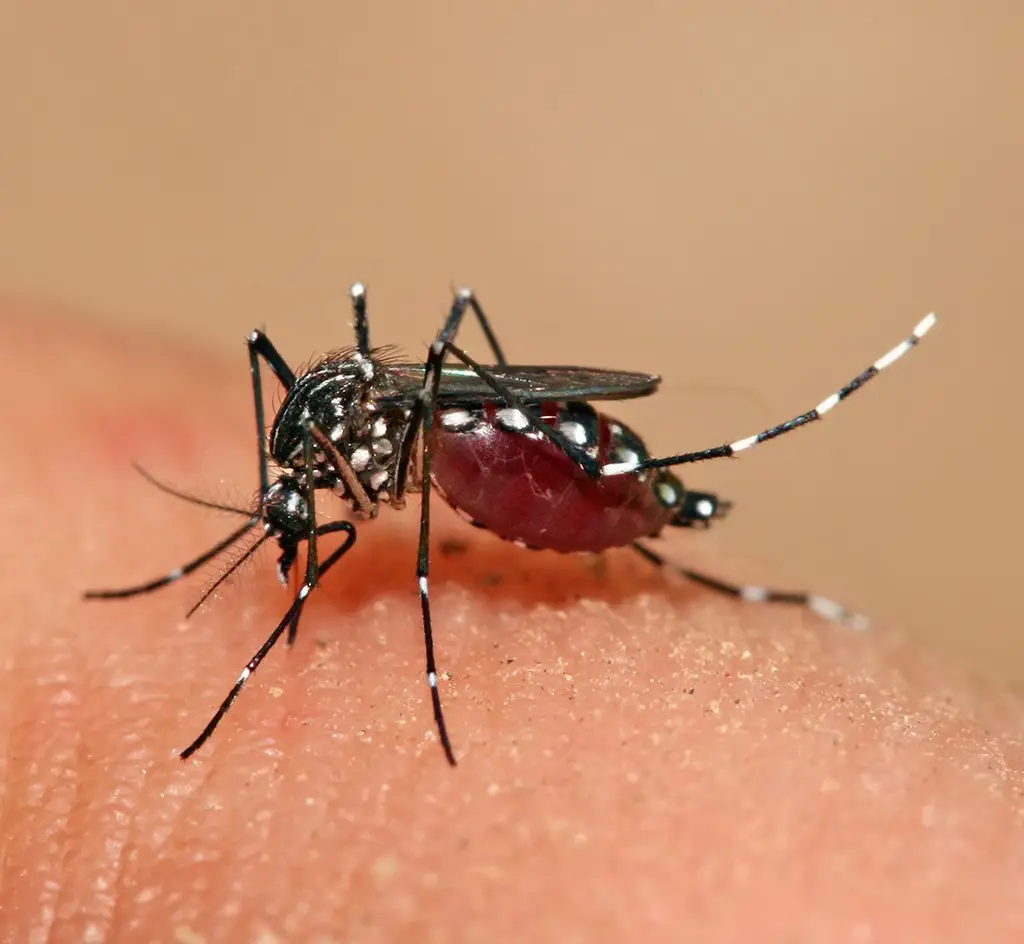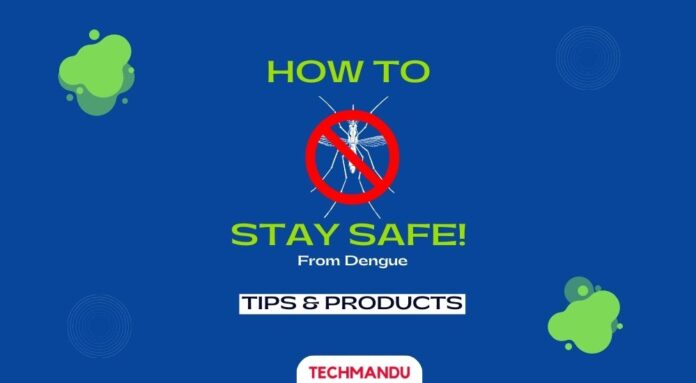Dengue has again struck parts of Nepal with outbreaks in many areas. With the rainy season being at its peak, many Nepali households are living in fear of catching this viral infection. While the rule of thumb is to not let a body of water form around, among other immediate solutions, there are stringent measures to be exercised to stay away from mosquitoes and dengue in general. As it’s said, “prevention is better than cure”, we are listing many tips and tools you can use to stay safe from this Dengue infection in Nepal.
Before that let’s learn a bit about the Dengue infection first.
What causes Dengue?
Dengue is caused by the Dengue virus (DENV) which transmits to humans after the bite by an infected female Aedes mosquito. World Health Organization reports that about half of the world’s population lives at risk of Dengue with 100-400 million infections reported every year.
And Nepal is not exempt from its effect. In 2022, Dengue reportedly claimed over 88 lives while infecting 54,000 people across 77 districts.
You can recognize the female Aedes Mosquito with the black and white marking on the body and leg. They are mostly active in the morning and evening time. The virus can be transmitted even through a single bite.
The Aedes Mosquito lay eggs in Water containers, small water-filled sheds and turns into larvae and then adult fly. The life cycle of the Aedes egg to convert to an adult fly is around 7 to 8 days.
So, to prohibit Dengue mosquitoes near your place, you can find out the source of Mosquito Larvae and destroy them by just spilling the water containers filled with the larva. Stay Vigilant for the tiny water reservoir too.

Common symptoms
WHO states that the most common symptoms of Dengue are high fever (40°C/104°F), severe headache, muscle, and joint pain. Additionally, the infected can also suffer from nausea, vomiting, rash, swollen glands, etc.
What can be done to minimize the risk of Dengue?
the best preventive measure to evade the Dengue risk is to eliminate the sites where Aedes mosquitoes can lay eggs a process called source reduction. Lowering the number of eggs, larvae, and pupae also lowers the number of adult mosquitoes and helps contain the spread of the infection. Here are the common places these “small flies” take for their residence:
Indoor:
- flower vases
- water tanks, bathrooms, etc.
- plastic containers,
- corners, etc.
Outdoor:
- discarded bottles and tins
- tires
- potholes, construction sites
- husks, pods from trees
- Leaf axils of plants, etc.
In urban areas, especially people collect rainwater which can harbor the risk during the outbreak. So, it is advised that the containers are soundly covered. They should also be cleaned properly and scrubbed regularly (once a week) to remove the eggs to avoid their growth.
Community participation also plays a role in Dengue prevention. Households must harmonize in reducing garbage, controlling water-forming areas, and working on sanitation as well as spreading awareness on reducing the risk of its spread.
Now, let’s see what products help you keep away from “Dengue mosquitoes” and stay safe.
Products to prevent Dengue
The most immediate solution to keep away from dengue is by wearing long-sleeved shirts and long pants. You must be consistent with your clothing all day and night. However, if it is not possible or convenient for you, there are other workarounds too. You can use repellent cream, spray, and swatter which we will list below. Remember, that staying away from mosquitoes is the only solution to guard yourself from the fatal Dengue.
1. Mosquito nets
Nets are the most commonly talked about product when talking about staying away from mosquito bites. Thankfully, it’s not difficult to find them. But you may want to be careful while buying any of these. They come in different shapes and sizes to match your convenience. On Daraz, you get various types of mosquito nets- regular, portable, portable & foldable, etc.
Depending on their design and size, their price range from Rs 400- Rs 3,000. When it comes to warding off mosquito attacks, nets are always an immediate solution for indoor stays. As they don’t need electricity and possibly save you from other annoying and harmful insects during your sleep, they are more than handy.

2. Vaporizer
Mosquito vaporizers/liquidators are another commonly used product to combat mosquito bites. You can use them indoors as an alternative to nets or to add an extra layer of security. Good Night, Mortein is some of the popular mosquito vaporizers used across Nepali households.
One bottle of it gives you around 10 days of use even if you keep it on all night. The quibble with it? The need to have power. In times of power shortage, they won’t be as effective however, the smoke they emit can stay for a longer duration. It is advantageous as some who fear any harm from the chemicals can only switch on the device for a few hours and turn it off as the gas can do the work for some hours.
These insecticides are a very good method of keeping away mosquitoes and other harmful insects for a sound sleep. And you can find them on Daraz too at convenient prices averaging Rs 130.
3. Anti-mosquito cream
Additionally, anti-mosquito creams provide decent protection against mosquitoes and that could be very helpful to prevent Dengue. You can apply them anytime while going out, while on a bus, taxi, or at work. But beware! They are said to cause skin irritation and inflammation for some but moderate use may not harm as much. Anyway, you can find them online at convenient prices.

Buy Anti-Mosquito Cream
- Remos Anti Mosquito Cream: 70 gm: Works for 10 hours: Nice Smell/Highly Recommended With Orange Flavor
- Odomos Anti Mosquito Cream: 50 gm:
4. Swatter/bats/rackets
Swatter, racket, or bat, whatever you call it, they are another mosquito killer. Whether you get mosquitoes in large swarms or are bothered by a few, the electrically-charged mesh can effectively kill the Dengue-causing culicids. The only grain with a grain of salt here is that they need 2-3 hours of charging before being able to use them to their fullest.

Also, you might be better off not touching the mesh which comes often in three layers. Mosquito rackets use capacitors and touching them might give you a high-voltage shock as well as cause damage to itself. Since they don’t provide protection as effectively as nets, anti-mosquito bats can only be an option, but a good option if you want to take no risk against Dengue.
Anti-mosquito bats are available on Daraz and they cost around Rs 500 to Rs 1,300.
5. Mosquito-repellent spray
Mosquito-repellent sprays are another handy option to scare away “Dengue mosquitoes”. You can apply them to parts of your body that are exposed. It’s recommended that you use sunscreen first before spraying yourself with the anti-mosquito spray. It’s also best to first spray them on the palms before using them on the face, hands, ankles, and other parts.
Likewise, since mosquitoes can bite through the clothing, you can also apply spray or creams underneath to ensure protection.
6. Mosquito-repellent sticker for babies
The mosquito-repellent sticker patches are “made for kids” products that are made with natural ingredients. They are DEET-free and non-toxic. The patches contain chemicals that chase away mosquitoes which can potentially cause Dengue.

However, their effectiveness reduces as the chemical evaporates in the air. These patches are best used as an option rather than the only choice. You can find anti-mosquito sticker patches for convenient costs. Buy the Repellent from here below.
As per the Health Ministry, a total of 11,157 Dengue cases have been reported across Nepal as of August 09. Of the total, Koshi province has reported the highest number of cases with 8,420. Bagmati has so far reported 1,547 cases.
Gandaki and Far-West (Sudurpaschim) Provinces have reported 481 and 404 Dengue cases respectively.
In summary, you can buy the products below to stay away from Dengue Infection.
Dengue infection hasn’t dissipated yet. So, we urge our readers to do their best to keep away from mosquitoes and Dengue. Most of all, do ensure not to allow a body of water of any size in the open or in any small or large containers where mosquitoes can lay eggs. You also need to destroy it before it becomes a fly, by just spilling the water or cover with a lid in case of big containers. Once again, “prevention is better than cure.” Stay safe, stay healthy.



